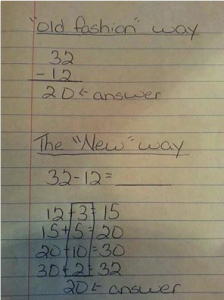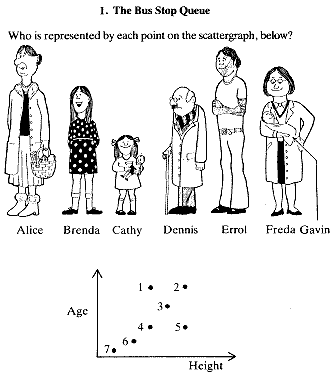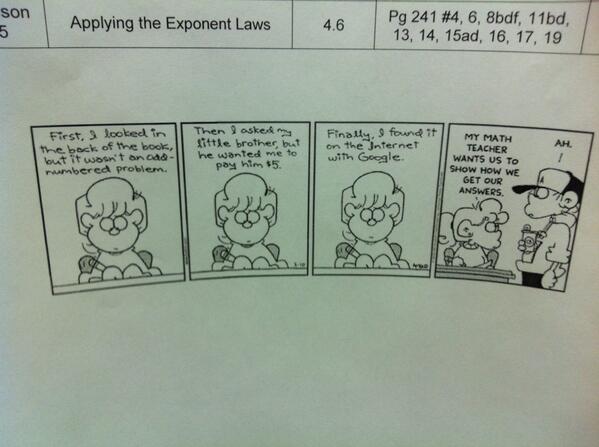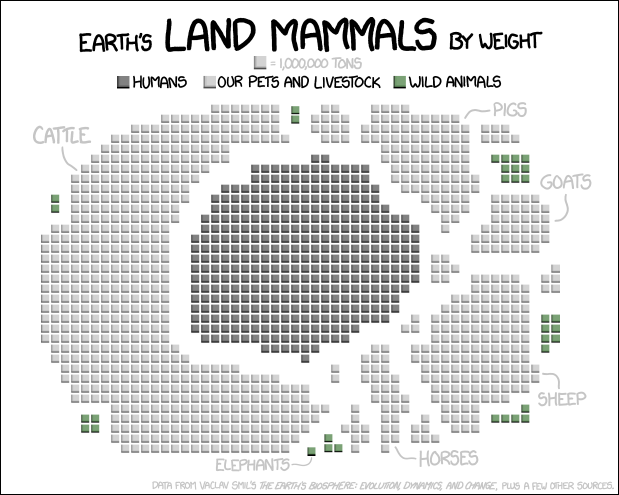 OK so this is not necessarily about grade 7-12 math but it has been making the rounds on the Facebook and Twittersphere. It's more about the fight between the "back to basics" and the "problem solving" camps. The premiss is that this incremental step approach to subtraction is outlandishly complex compared to the traditional algorithm. And yes the traditional method is definitely more efficient but there are two main issues as far as I am concerned:
OK so this is not necessarily about grade 7-12 math but it has been making the rounds on the Facebook and Twittersphere. It's more about the fight between the "back to basics" and the "problem solving" camps. The premiss is that this incremental step approach to subtraction is outlandishly complex compared to the traditional algorithm. And yes the traditional method is definitely more efficient but there are two main issues as far as I am concerned:- the examples they show are really simple so the complexity of this alternate method seems even more ridiculous
- both examples require no carrying. It is when carrying is involved that those kids with difficulty fall apart.
 There were several nice responses to this. Mathy Cathy was the first one that I saw and she pointed out two others. One from Jusin Alon had a nice summary of what Common Core is. I especially liked the example of 1001 - 999 where carrying is crazy if you do it the traditional method. Christopher Danielson took it two steps further and actually answered the question posed in the 2nd example but also showed a great video of a student solving 1001 - 999 using a step method and getting the answer with no problem but completely falling apart when forced to do it the traditional method.
There were several nice responses to this. Mathy Cathy was the first one that I saw and she pointed out two others. One from Jusin Alon had a nice summary of what Common Core is. I especially liked the example of 1001 - 999 where carrying is crazy if you do it the traditional method. Christopher Danielson took it two steps further and actually answered the question posed in the 2nd example but also showed a great video of a student solving 1001 - 999 using a step method and getting the answer with no problem but completely falling apart when forced to do it the traditional method.I guess my best analogy of why this sort of thing is important is about this fictitious example. Imagine there was an expectation that required a student to lift a pile of 10 books from the floor to a desk. Some kids might be able to lift all the books at once while others can only do it one at a time. But if they all get the books up their then that's all that should matter.
Curriculum Tags: All
http://www.mathycathy.com/blog/2014/03/facebook-math-and-the-common-core/
http://relearningtoteach.blogspot.ca/2014/03/ccbs.html
http://christopherdanielson.wordpress.com/2014/03/22/the-latest-common-core-worksheet/
 I love this challenge:
I love this challenge:Your challenge is to design a game, using only a fair coin, that you have a 1/3 chance of winningI think it could be done in a grade 7 or 8 class with a little bit of scaffolding but for sure in a grade 11 college or Data Management class.
Curriculum Tags: Gr7, Gr8, MBF3C, MDM4U
http://wordplay.blogs.nytimes.com/2014/03/17/coin/
 Triangle congruence used to play a much bigger role but it still exists in our grade 7 curriculum. Here is a nice discovery activity for investigating the idea of congruence. I like all the handouts and templates available.
Triangle congruence used to play a much bigger role but it still exists in our grade 7 curriculum. Here is a nice discovery activity for investigating the idea of congruence. I like all the handouts and templates available.Curriculum Tags: Gr7
http://misscalculate.blogspot.ca/2014/03/triangle-congruence-proofs.html
 I really like this investigative approach to introducing permutations and factorials. I have done something similar to parts of this but this is far more extensive. I love the detail here.
I really like this investigative approach to introducing permutations and factorials. I have done something similar to parts of this but this is far more extensive. I love the detail here.Curriculum Tags: MDM4U
http://mr-stadel.blogspot.ca/2014/03/4.html
 As I said, I like actually doing experiments to collect data. This one using paper airplanes is good for central tendency and single variable data with dot plots.
As I said, I like actually doing experiments to collect data. This one using paper airplanes is good for central tendency and single variable data with dot plots.Curriculum Tags: Gr7, MBF3C, MDM4U
http://ispeakmath.org/2014/03/24/paper-airplanes-for-measures-of-central-tendencies/
 It seems like we have no shortage of data collection here. I like this experiment to get some "dirty" linear data with nothing more than some dry spaghetti, paper cups and pennies (you gotta do something with them).
It seems like we have no shortage of data collection here. I like this experiment to get some "dirty" linear data with nothing more than some dry spaghetti, paper cups and pennies (you gotta do something with them).Curriculum Tags: MPM1D, MFM1P, MFM2P
http://marybourassa.blogspot.ca/2014/03/mfm2p-day-29-spaghetti-bridges.html

Powers of 2. They have a hold on me. That is, the game 2048 does. I don't usually play games on my phone but I like this one. And its pretty cool that it was developed by a 19 year old.
Curriculum Tags: Gr7, Gr8
http://mathmunch.org/2014/03/24/2048-2584-and-variations-on-a-theme/
I have always been a fan of collecting real data and fitting it to a mathematical model. Science has a lot to offer us in this area and Boyle's Law is one of those relationships. The nice thing is that this experiment is really easy to pull off. So if you need an experiment for MCR3U regarding inverse functions, then this is the experiment for you.
Curriculum Tags: MCR3U
http://sciencedemo.org/2014/03/ingenious-cheap-way-investigate-boyles-law/

























